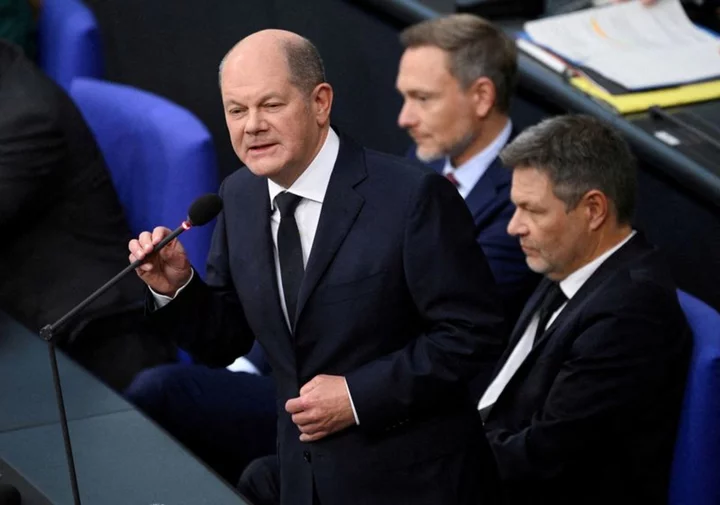By Holger Hansen and Riham Alkousaa
BERLIN (Reuters) -The German government has imposed a freeze on most new spending commitments in what officials on Tuesday said was a necessary step as Chancellor Olaf Scholz's coalition grapples with a deepening budget crisis.
The government's spending plans were thrown into disarray by a court ruling last week that blocked the government from transferring 60 billion euros ($65 billion) in unused funds from the pandemic towards green initiatives and could starve some German industry of support to keep it competitive in a weak economy.
The ruling has strained Scholz's three-way coalition, which pitches the pro-spending Greens against hawks in the fiscally conservative Free Democrats (FDP) over whether to suspend self-imposed limits on raising new debt.
The finance ministry has frozen future spending pledges across almost the entire federal budget, a letter by the budget state secretary showed, in a sign of how seriously it was taking the potential fallout to its finances.
The measure applies to all ministries and a 200 billion-euro fund that was set up to support companies through the pandemic and the energy crisis after Russia's invasion of Ukraine.
The 200 billion-euro fund is also now under threat by a prospective legal challenge from the resurgent main opposition Christian Democrats (CDU), which had brought the successful lawsuit against the 60 billion-euro climate fund last week.
Economy Minister Robert Habeck has warned that the court ruling could severely impact Germany's ability to support its industry through a green transition and keep jobs and value creation from moving abroad.
That could include planned chip factories, the expansion of the battery supply chain and the decarbonisation of steel, government sources said on Monday.
"These funds are not an add-on that one can carelessly do without ... the loss to the economy if investments were not made now would be even greater," Habeck told a news conference at a digital summit in the city of Jena.
The ruling had set off a "chain reaction" whose consequences needed further discussion, he said, stressing that Monday's extended budget freeze would give the government room to take money from elsewhere to save certain projects.
"And exactly how we will go about this, that's being urgently prepared and discussed behind the scenes and is not something for a press conference on the sidelines of a digital summit," he added.
DEBT BRAKE SUSPENSION?
Kevin Kuehnert, a high-ranking member of Scholz's Social Democrats (SPD) party, joined those calling for the government to suspend a constitutionally enshrined debt brake to free up more spending. Finance Minister Christian Lindner has so far opposed such a move.
Cutting 60 billion euros from the budget by "reversing the transformation of our society, no longer supporting companies in international competition and thus losing jobs in Germany, that's not something the SPD was elected to do," Kuehnert said.
In an apparent show of unity however, Habeck from the Greens party and Digital Minister Volker Wissing from the FDP emphasised their good working relationship at the digital conference.
"For us, collaboration behind the scenes looks the same as on stage," Wissing said.
Public opinion appears to be divided on how the government, whose popularity has sunk during a weak economy and rising inflation, should proceed.
According to a survey by the RTL/ntv broadcaster, 44% of Germans believe the government should plug budget holes by making cuts elsewhere, while 38% think it should largely forgo projects that had been earmarked in the 60 billion-euro fund.
The CDU on Tuesday said the 2024 budget as it stands was not fit for purpose as a result of the court verdict.
However, there were also signs that the CDU's decision to take the government to court could rebound on federal states where the party heads the local government.
Hendrik Wuest, the state premier of the CDU-run government in North Rhine-Westphalia, said the federal government had to ensure that money kept flowing to industry in his state.
"The many thousands of employees, especially in energy-intensive companies, need the security that they will be supported," he told the Rheinische Post newspaper.
"The SPD-led federal government must stop spreading uncertainty among employees. That is irresponsible."
($1 = 0.9168 euros)
(Reporting by Holger Hansen, Riham Alkousaa, Andreas Rinke; writing by Matthias Williams; editing by Sharon Singleton)

